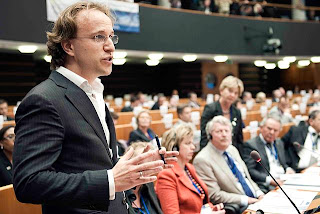 |
| Image source: WikiCommons, photo credit: J.t.h.groothedde |
For the past few months there has been much disagreement between member states on how the budget should look like over next few years. National politics has played a major role in the difference of opinion on the new budget. Even political blocks have formed with
many northern members including Sweden , Britain and Netherlands
arguing that the current draft of the budget need cutting down and French, Italy
and Spain were
stating that they support the draft budget as it was. Germany ,
the largest economy in the EU was torn between France
its usual alley in the EU and Britain ,
the leading nation demanding spending cuts.
After the weekend’s negotiations,
compromise by all members was agreed, with a 3% cut in the 2014-2020 budgets. Although
British Prime Minister David Cameron wanted more significant cuts, he was pleased
with the outcome that ended in some lowering of the budget. Even French President
Francois Hollande, who was
arguing that budget cuts, would weaken economic growth, was unable to prevent
it, but was content and willing to
compromise seeing that he won the argument for farm subsidies not to suffer any
major cuts.
In light of the economic down turn and crisis in some member
states, along with national governments slashing budgets over the last few
years, the EU has once again proven that although there is much difference in
opinions between countries, cooperation and compromise on major economic issues can transpire. The agreement over the
weekend shows the rest of the world, that the EU system although still in a
process of improving its efficiency can bring economic growth to an entire
region or continent. One good aspect of the EU is how such a system can bring
regional rivals closer together through integration of their economies,
improving the lives of millions of people.
No comments:
Post a Comment